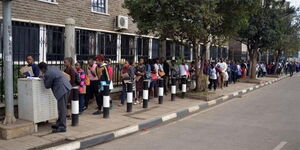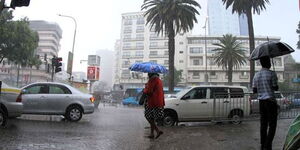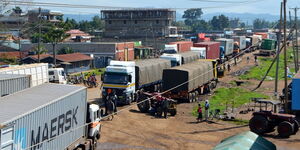Kenya Association of Motorists, which has a membership of 300,000, insists that a litre of petrol should retail at Ksh140 and not the current Ksh211.
In an exclusive interview with Kenyans.co.ke on Wednesday, the association's chairman Peter Murima stated that the state's interference in regulating the price was the main cause of record price hikes.
He added that according to the prevailing barrel prices of USD92 (Ksh13,404), the price per litre should only increase to Ksh140 when taxes and other overhead levies are added.
"Kenyans now have resigned to fate which does not mean we do not have power. The rate of fuel right now should be at Ksh140 per litre going by the world prices as well as all the logistics that involve the fuel dispensing," Murima stated.
Murima explained that since renaming the Energy Regulatory Commission (ERC) to the Energy and Petroleum Regulatory Commission (EPRA), the state now demands an upfront payment of taxes on the imported product, a charge that is then transferred to the consumer.
"When the fuel arrives, the government starts subtracting the costs before it is offloaded because it demands that all the taxes are paid upfront which forces the traders to go for loans so that they can pay for the taxes. The dealers now pass that cost to the retail market," he added.
"Besides the taxes which are so high and irrational, it is possible that any country in the world can ensure the energy is within the range of affordability, whether it is through subsidy or good management of the economy, which ensures a growth in the economy."
The trouble, according to Murima, began in 2019 after ERC rebranded to EPRA which he argues limited the authority's independence.
He claimed that at the time, the state discredited a formula for calculating the fuel price agreed upon by the then-independent ERC.
"The government reneged the formula of calculating taxes adopted by the ERC which was independent and had independent commissioners," he added.
"When the commissioners started realising that there was interference, they resigned then the government hijacked ERC and renamed it EPRA. Now, the government controls private businesses which is wrong."
According to Murima, the price will significantly reduce if the price is determined by the market forces that regulate demand and supply.
He also faulted the state for removing the subsidy which is charged on all fuel sales at the rate of Ksh5 per litre. The chairman noted that the subsidy helped guarantee stability in prices and enabled businesses plan better.
"As oil marketers compete, the oil prices will definitely come down because motorists will look for the best prices. The excuse that fuel prices globally have increased is false because it is still oscillating around Ksh91 and is still projected to be around the same price in 3 months," he added.
Currently, oil costs Ksh13,993 per barrel, an increase from Ksh12,962 (USD88) on Monday.
International experts, as a result, expressed fears that inflation is about to hit Central Banks across the world tasked with keeping the price at bay.
The inflation is likely to be exacerbated by the supply deficit announced by Saudi Arabia and Russia which cut supply from 1 million barrels per day to 500,000.
Fears gripped Kenyans after government officials also hinted that the price is likely to to Ksh260 per litres by February.












